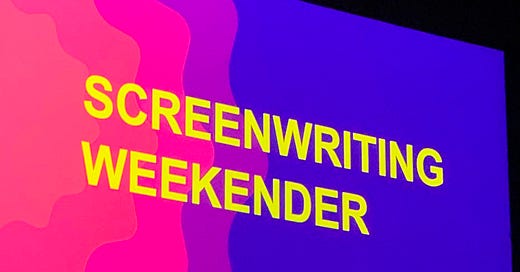Seven things I learned at the New Writing North Screenwriting Weekender
Feeling like an outsider and what that means for creativity
‘I’ve always got this other me who went down another path. The last time I was walking onto a stage was to collect a Golden Globe, and there’s a ghost of a person who used to sit here and could not have believed I would have been called onto the stage saying he had just been nominated for an Oscar.’
That was how screenwriter Peter Straughan began his talk at the New Writing North Screenwriting Weekender in Newcastle’s Live Theatre last weekend, during an absolutely fascinating speech about what it means to rise from humble beginnings to an international stage.
The event was incredible, with gems of advice strewn throughout. I know almost nothing about the world of film and TV, which made it all the more interesting.
Don’t give in to doubt, despair, doom, derision or contempt
Peter Straughan explored the concept that imposter syndrome is rife in writing, as there are thousands of tiny decisions made on every page, each with a value judgement attached. The important thing is to cultivate and trust the inner voice, he said, because that will form the guiding principles of writing.
Writing is an instinct, but if it is muted, it becomes difficult to produce meaningful work, he said.
AI is not going to take your job, but someone who is really good at AI might challenge it.
During a panel on Working with Indies, one of the panelists discussed how becoming great at AI-based logic tasks was increasingly important in the book and film industry to cut down time. That freed up more creativity, ultimately giving a competitive advantage to those who didn’t shy away from using AI.
The tricky relationship between creatives and AI will continue to cause fierce anxiety and debate, and it was fascinating to hear it discussed as an outsider.
In comedy, you buy the sadness with the laughs you’ve already had.
During the panel on writing comedy, Malak El-Gonemy, Jason Cook, Ashley Storrie and Mark Brotherhood discussed the trade-off of sadness and humour, and how if there are sad moments, the writer has to pick it back up again and return to something even funnier. One repeated discussion point was that comedy-drama is tricky to pitch, because in the UK it falls between two stools.
Ambition-wise, push yourself. Hard.
Tony Schumacher, the brilliant screenwriter of The Responder, had two particular nuggets of advice which he delivered to laughter from the audience (with accompanying actions):
‘Push yourself. You’ve got to claw yourself to the top of the grave until they get a spade and dig you out.’
‘You’re like a hyena with a half-dead zebra. Don’t let them get running or you’ll starve. Get them on the ground and don’t let go.’
‘Nobody is going to believe in you as much as you do’
The actor/rapper/singer-songwriter Kema Sikazwe (I, Daniel Blake) spoke on the Mental Health and Wellbeing for Writers panel about how rejection, harsh notes, and rewrites cause fear of failure, which can be deadly for creatives.
He discussed sitting on work for too long because of fear that if things are not perfect, they will be rejected. There was a thread running through the weekend that freelancers working to tight deadlines could at times feel despondent, blame individuals within the industry as well as the industry itself, and find it hard even when they had projects greenlit, because the reality was disappointing in comparison to the perfect idea the writers had in their heads beforehand.
The solution to that came back time and time again, particularly from Tony Schumacher - was to write more, have more projects to work on, and believe in your own talent.
Stay connected with others
Again and again, the issues of being a writer were clear - long hours, little money, working in isolation, being creative and precarious work, added to a tendency to build narrative (!) meant developing a toolkit was important to build resilience.
The four ideas of 1) looking out for the self and others, 2) keeping a chart of mental health ebbs and flows, 3) a list of ways to manage mental health, and 4) clear communication with others, particularly about how they could make changes, seemed to work well as a framework. Collaboration, staying connected with others, and understanding that sometimes luck and perseverance both play a part in career success were reiterated.
Money-wise, you might just make more working at Tesco, and that is OK
The weekend was mostly very honest about the realities and drawbacks of being a writer, but only once or twice did any of the panelists discuss the financial realities. One writer said their project took 10 years to make and earned them £70,000, paying them just £7,000 a year, which is never going to be enough for that Hollywood mansion with its own swimming pool.
One of the speakers said that ‘Writing makes you rich in every way except financially’ which I thought was wise. John Higgs said ‘Nobody wants you to become a writer,’ meaning that it is an act of taking control with risks involved, but that sometimes they pay off financially too.
The industry is your customer, not your employer
John Higgs said that turning up and working is the most important thing, but that the things you want to write do not always match up with what the audience want to see, and that in turn thaose ideas must make sense to the producers in the industry. I found that a fascinating concept as it hadn’t actually occurred to me that screenwriting is more like a marketplace and that if the visitors aren’t buying what you are selling, you need to change because that will be quicker than expecting the industry to mould to you.
On the train on the way home, I read through my notes as it was so information dense I could barely take in everything that was said, and I was astounded by how generous, wise and entertaining all the speakers had been.
The other people taking part were so friendly too - easy to chat with, supportive and generous, and I had some fascinating conversations, cups of tea and meals while I was there with a whole host of clever and inspirational writers. The idea of networking is always excruciating, but the reality is that nearly everyone is cordial, approachable and warm.
One of the things I enjoyed most was coming at it as a complete amateur, so I learned something from every panel. I really hope New Writing North runs the course again as I learned to much. And at £100 it was an absolute bargain - many weekend courses are £600-£1000+ so completely out of most writers’ pockets. Overall, I left feeling inspired, happy and just a little bit tired!







I really enjoyed this, thanks for sharing your insight. I especially like the idea that the industry is your customer, not your employer. Such a useful way of thinking about commercialising any creative work!